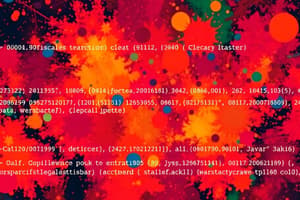Podcast
Questions and Answers
What is the purpose of generics in Java?
What is the purpose of generics in Java?
- To introduce type safety in generic code (correct)
- To complicate the Java Collections
- To remove type parameters at compile time
- To increase the overload at runtime
Which statement is true about the ClassGeneric class?
Which statement is true about the ClassGeneric class?
- It cannot store any values
- It can only store double values
- It can store values of any data type (correct)
- It can only store integer values
What is the output of the 'objG2.print()' method?
What is the output of the 'objG2.print()' method?
- '10.5'
- 'Generic Class in super easy' (correct)
- '10.8'
- '10'
What is the purpose of the 'print' method in the ClassGeneric class?
What is the purpose of the 'print' method in the ClassGeneric class?
What is the primary advantage of using generics in Java?
What is the primary advantage of using generics in Java?
Which data structure uses the mechanism of First-In-First-Out (FIFO)?
Which data structure uses the mechanism of First-In-First-Out (FIFO)?
In a queue, where is a new element added?
In a queue, where is a new element added?
What is the primary function of the 'dequeue' operation in a queue?
What is the primary function of the 'dequeue' operation in a queue?
Which end of a queue is used for inserting an element?
Which end of a queue is used for inserting an element?
What happens to the front end when a new element has to be deleted from a queue?
What happens to the front end when a new element has to be deleted from a queue?
Which operation is responsible for adding an element to the back of a queue?
Which operation is responsible for adding an element to the back of a queue?
What is the purpose of the 'IsFull()' operation in a queue?
What is the purpose of the 'IsFull()' operation in a queue?
In which data structure can a queue be implemented using a static array with generic datatype?
In which data structure can a queue be implemented using a static array with generic datatype?
What happens to the front end when a new element is inserted in a queue?
What happens to the front end when a new element is inserted in a queue?
What is the primary advantage of using generics in Java for implementing a queue?
What is the primary advantage of using generics in Java for implementing a queue?
Flashcards are hidden until you start studying
Study Notes
Generics in Java
- The primary purpose of generics in Java is to provide type safety, which means to ensure that the correct type of object is used.
ClassGeneric
- The ClassGeneric class is a generic class, which means it can work with any data type.
Methods in ClassGeneric
- The 'print' method in the ClassGeneric class is used to print the value of the object.
Print Method
- The output of the 'objG2.print()' method depends on the implementation of the 'print' method in the ClassGeneric class.
Advantages of Generics
- The primary advantage of using generics in Java is to provide type safety, which helps to avoid ClassCastException at runtime.
Queue Data Structure
- A queue is a data structure that uses the mechanism of First-In-First-Out (FIFO).
Queue Operations
- In a queue, a new element is added to the rear end.
- The 'dequeue' operation is responsible for removing an element from the front end of a queue.
- The front end of a queue is used for deleting an element.
- The 'enqueue' operation is responsible for adding an element to the rear end of a queue.
IsFull Operation
- The 'IsFull()' operation in a queue is used to check if the queue is full.
Implementing Queue
- A queue can be implemented using a static array with a generic data type.
- When a new element is inserted in a queue, the front end remains the same.
- The primary advantage of using generics in Java for implementing a queue is to provide type safety, which helps to avoid ClassCastException at runtime.
Studying That Suits You
Use AI to generate personalized quizzes and flashcards to suit your learning preferences.



